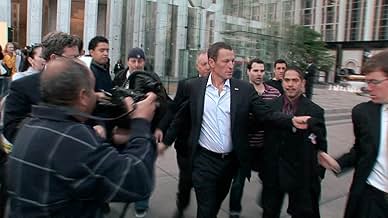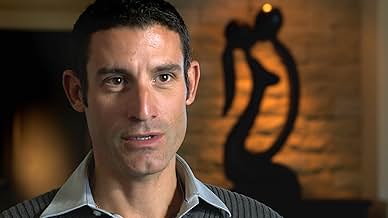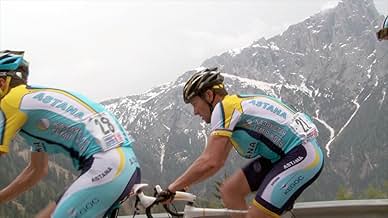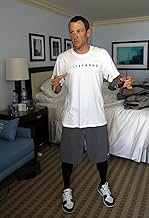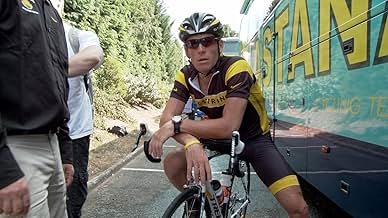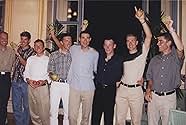AVALIAÇÃO DA IMDb
7,2/10
8,2 mil
SUA AVALIAÇÃO
Adicionar um enredo no seu idiomaA documentary chronicling sports legend Lance Armstrong's improbable rise and ultimate fall from grace.A documentary chronicling sports legend Lance Armstrong's improbable rise and ultimate fall from grace.A documentary chronicling sports legend Lance Armstrong's improbable rise and ultimate fall from grace.
- Indicado para 1 prêmio BAFTA
- 2 vitórias e 8 indicações no total
Michael Bloomberg
- Self - NYC Mayor
- (cenas de arquivo)
Bill Clinton Jr.
- Self - Former US President
- (cenas de arquivo)
Anderson Cooper
- Self - Interviewer
- (cenas de arquivo)
Sheryl Crow
- Self - Lance's Girlfriend
- (cenas de arquivo)
Alex Gibney
- Self - Narrator
- (narração)
Tyler Hamilton
- Self - Teammate
- (cenas de arquivo)
Avaliações em destaque
The Armstrong Lie is a documentary that takes a deep look at one of the most horrendous best kept lies of the sports history, the rise and fall of Lance Armstrong after being disgracefully accused for doping. He was once known as the greatest cyclist the world has ever seeing who won 7 Tour De France titles from 1999-2005 after battling and recovering from cancer.
After winning 7 titles and being away for 4 years in retirement Armstrong makes a surprise come back in 2009 with hopes of winning another title and raising funds for cancer patients. The director of this documentary Alex Gibney was hired to make a documentary of the comeback of Armstrong and he has being covering Armstrong's sports history for quite some time. But as the doping scandal came to light the original project was never finished. But in 2013 Gibney decided that he needs a proper ending to his documentary and re-opened it after Armstrong makes a confession on Oprah Winfrey show.
This documentary is quite easy and interesting to follow. For someone with even a mild knowledge about professional cycling and Armstrong it can be digested without much effort. While having a deep look at Armstrong's sporting career and the doping dilemma the documentary effectively provides important background information about the sport itself that fuels the main plot. And it manages to tell the story from several perspectives than being biased in to one point of view, the intention being the viewer to have their own conclusion of what had really happened. There ample amount of historical footage of practice runs, races, press conferences, court trials and other video that builds a strong case relating to each other. Obviously for being someone like Armstrong most of his well-known part of his entire life is on film somewhere. The challenge which the director goes through is to filter the most relevant and create a flow that doesn't over hype or dull to the viewer. In my opinion the job was well done.
The Armstrong Lie is a powerful piece of documentary film making. And it would give you new perspective of what really went on with Lance Armstrong. Maybe you have followed his case eagerly while it was hot but now since things have gone a bit cold a relook would be ideal. Just as Armstrong phrase many times it felt OK at the time.
After winning 7 titles and being away for 4 years in retirement Armstrong makes a surprise come back in 2009 with hopes of winning another title and raising funds for cancer patients. The director of this documentary Alex Gibney was hired to make a documentary of the comeback of Armstrong and he has being covering Armstrong's sports history for quite some time. But as the doping scandal came to light the original project was never finished. But in 2013 Gibney decided that he needs a proper ending to his documentary and re-opened it after Armstrong makes a confession on Oprah Winfrey show.
This documentary is quite easy and interesting to follow. For someone with even a mild knowledge about professional cycling and Armstrong it can be digested without much effort. While having a deep look at Armstrong's sporting career and the doping dilemma the documentary effectively provides important background information about the sport itself that fuels the main plot. And it manages to tell the story from several perspectives than being biased in to one point of view, the intention being the viewer to have their own conclusion of what had really happened. There ample amount of historical footage of practice runs, races, press conferences, court trials and other video that builds a strong case relating to each other. Obviously for being someone like Armstrong most of his well-known part of his entire life is on film somewhere. The challenge which the director goes through is to filter the most relevant and create a flow that doesn't over hype or dull to the viewer. In my opinion the job was well done.
The Armstrong Lie is a powerful piece of documentary film making. And it would give you new perspective of what really went on with Lance Armstrong. Maybe you have followed his case eagerly while it was hot but now since things have gone a bit cold a relook would be ideal. Just as Armstrong phrase many times it felt OK at the time.
Many were shocked when Lance Armstrong (finally) admitted to his use of steroids, which assisted in his 7 Tour Du France wins. Stripped of his titles, dumped by his multi-million dollar sponsorships, banned from all World Anti-Doping Agency governed sports, and literally taken out of the record books for all 7 years he won, most expected him to experience a deep shame and regret over his actions. Most of us, upon revealing our deepest secrets, and the lies that we chose to live, might respond in that way, but Lance Armstrong is a different kind of person, and perhaps doesn't function in the same capacity.
Oscar winning documentary film maker Alex Gibney tackles another societal dysfunction, in his attempt to tell the story of why one of sporting world's most famous names, would come out to admit his fraud to the world. It's an absolutely spellbinding story, and doesn't tip-toe around the subject. Rather, it opens up at his most publicly shameful moments, when he told Oprah Winfrey on national television (in yes / no fashion) that he had been cheating the whole time he was winning one of the most grueling competitions in the world. But there is a great deal more to this story, and Gibney delves into some of the bigger problems surrounding the sport, his issues with bullying team mates, the nature of cheating, and most importantly: Why Armstrong acts the way he does.
The American Psychiatric Association defines the narcissistic personality as:
"In which a person is excessively preoccupied with personal adequacy, power, prestige and/or vanity, mentally unable to see the destructive damage they are causing to themselves and often others."
Whenever I think of this personality, a few names come to mind (Donald Trump, and Kanye West are just a few), but I think Lance Armstrong fits this description well. I don't particularly think that he, and others who share these traits, are necessarily terrible people, but it does make them capable of some truly awful actions. It's a remarkable study into this type of personality. Armstrong admits to wrong-doings, but never feels remorse for his actions. It's remarkable how he treats his own teammates throughout his career, and forces us to see him as a very driven man, yet at the same time, one capable of very criminal action.
At this time, in 2016, Armstrong faces a 100 million dollar lawsuit brought forth by the federal government for defrauding the U.S. Postal service (the main sponsor during his tours). It's expected to ruin him financially, but many don't expect a decision requiring a full penalty. Perhaps his actions do have consequences, but he's apt not to let that bother him. That being said, Alex Gibney narrates and describes the situation facing him and sport of cycling rather well. I would recommend this documentary to anyone who was interested in Armstrong as a competitor, but also to really let the depth of his actions sink in with the viewer.
One of Gibney's best, and more personal documentaries.
8/10
Oscar winning documentary film maker Alex Gibney tackles another societal dysfunction, in his attempt to tell the story of why one of sporting world's most famous names, would come out to admit his fraud to the world. It's an absolutely spellbinding story, and doesn't tip-toe around the subject. Rather, it opens up at his most publicly shameful moments, when he told Oprah Winfrey on national television (in yes / no fashion) that he had been cheating the whole time he was winning one of the most grueling competitions in the world. But there is a great deal more to this story, and Gibney delves into some of the bigger problems surrounding the sport, his issues with bullying team mates, the nature of cheating, and most importantly: Why Armstrong acts the way he does.
The American Psychiatric Association defines the narcissistic personality as:
"In which a person is excessively preoccupied with personal adequacy, power, prestige and/or vanity, mentally unable to see the destructive damage they are causing to themselves and often others."
Whenever I think of this personality, a few names come to mind (Donald Trump, and Kanye West are just a few), but I think Lance Armstrong fits this description well. I don't particularly think that he, and others who share these traits, are necessarily terrible people, but it does make them capable of some truly awful actions. It's a remarkable study into this type of personality. Armstrong admits to wrong-doings, but never feels remorse for his actions. It's remarkable how he treats his own teammates throughout his career, and forces us to see him as a very driven man, yet at the same time, one capable of very criminal action.
At this time, in 2016, Armstrong faces a 100 million dollar lawsuit brought forth by the federal government for defrauding the U.S. Postal service (the main sponsor during his tours). It's expected to ruin him financially, but many don't expect a decision requiring a full penalty. Perhaps his actions do have consequences, but he's apt not to let that bother him. That being said, Alex Gibney narrates and describes the situation facing him and sport of cycling rather well. I would recommend this documentary to anyone who was interested in Armstrong as a competitor, but also to really let the depth of his actions sink in with the viewer.
One of Gibney's best, and more personal documentaries.
8/10
THE ARMSTRONG LIE is a fascinating documentary. Shot over a period of four years, it purports to investigate the oft-repeated claim that cyclist Lance Armstrong was a cheat, and that every single one of his Tour de France wins were achieved by taking drugs. Alex Gibney's narrative begins as a defense of Armstrong's behavior, but as different elements of the truth emerge, so the filmmaker has to keep readjusting his position. Gibney is obviously a fan of Armstrong (as many people still are), but as the seamy details of what the cyclist did in order to win his races gradually emerge, so the filmmaker gradually understands how wrong-headed he has been give his unquestioning support. Armstrong emerges as a thoroughly unsavory character, pathologically unwilling to acknowledge the truth about himself, and always looking to manipulate the media so that he emerges in a positive light. Even his so-called 'confessional' interview with Oprah looks like a deliberate attempt to rescue his reputation. As the narrative unfolds, so Gibney gradually comes to understand the truth about his subject, and realizes to his cost that much of the film has unwittingly helped to obfuscate that truth, portraying Armstrong instead as a man more sinned against than sinning. It is only right at the end that Gibney admits the truth of Armstrong's motives, and how Armstrong himself has deliberately duped the filmmaker. As a result THE ARMSTRONG LIE is a film that is more about media manipulation than anything else, revealing just how persuasive - and dangerous - a person Armstrong actually is. There's no guarantee that he might not manage to clear his reputation in the future, despite what he has done.
This movie - and the situation it chronicles - forces us to consider
to what extent we can expect an even playing field - literally - when we watch sports. The athletes say, "Every one else was doing it."
When fans watch NASCAR races, I hope they understand that it's a team sport. The people who built the car, the people who maintain it, the guys who change the tires, the spotters and others contribute as much or more to the win as does the driver. However, when we see an individual athlete - biker, runner, skier, etc. - compete, do we see that the "best man" wins or the performer with the best doctor, the best chemist and research department and the cleverest lawyer to get around the system, as one of the interviewees in this movie suggests.
Should we accept that performance enhancements are now a part of sports, athletes and their supporters will continue to find ways to counter efforts to limit them and accept that? The destructive qualities of steroids - including their potential for violent behavior and the process Armstrong admitted using raise doubt. The drug Amstrong took and the use of blood transfusions to short-cut the body's process for communicating and responding to muscle fatigue surely must be physically destructive. However, I have long had questions about the long-term effects of professional football tackles, questions now being answered, at least in terms of head injuries. Players and fans continue to accept this.
This movie may be more interesting to people who are not cycling fans but is a good exploration of a range of observers and participants.
to what extent we can expect an even playing field - literally - when we watch sports. The athletes say, "Every one else was doing it."
When fans watch NASCAR races, I hope they understand that it's a team sport. The people who built the car, the people who maintain it, the guys who change the tires, the spotters and others contribute as much or more to the win as does the driver. However, when we see an individual athlete - biker, runner, skier, etc. - compete, do we see that the "best man" wins or the performer with the best doctor, the best chemist and research department and the cleverest lawyer to get around the system, as one of the interviewees in this movie suggests.
Should we accept that performance enhancements are now a part of sports, athletes and their supporters will continue to find ways to counter efforts to limit them and accept that? The destructive qualities of steroids - including their potential for violent behavior and the process Armstrong admitted using raise doubt. The drug Amstrong took and the use of blood transfusions to short-cut the body's process for communicating and responding to muscle fatigue surely must be physically destructive. However, I have long had questions about the long-term effects of professional football tackles, questions now being answered, at least in terms of head injuries. Players and fans continue to accept this.
This movie may be more interesting to people who are not cycling fans but is a good exploration of a range of observers and participants.
In 2009 Alex Gibney set out to make a documentary about Lance Armstrong's return to the racing circuit. Armstrong had won the Tour De France seven times and had beaten cancer. He was a winner in every respect until finally the allegations that had dogged him for years, that he had used performance enhancing drugs, caught up with him and on Oprah Winfrey's television show he finally admitted to cheating and Gibney's film, originally designed to celebrate Armstrong, became "The Armstrong Lie", as Gibney searched for reasons for his behaviour. Could it be that he simply had to become a winner whatever the cost? Gibney felt that Armstrong owed him since Armstrong had lied to him in 2009 when Gibney set out to celebrate Armstrong's career, so he continued with his film forcing Armstrong to confront his duplicitous past, (though even now Armstrong is holding some things back), and the result is this extraordinary film. "The Armstrong Lie" is the kind of film that pays tribute, not just to its subject, (though, perhaps, tribute isn't quite the right word in this case), but to the genre itself, (it's as exciting as any fictional thriller). Gibney already has an Oscar under his belt; in a just world he would have added another for this brilliant movie.
Você sabia?
- CuriosidadesFilmmaker Alex Gibney followed Lance Armstrong for four years with the intent of chronicling his return to cycling after retirement as Armstrong tried to win his eighth Tour de France. Unexpectedly, Gibney was also there when Armstrong admitted to doping, which resulted in the film being retitled from "The Road Back" to "The Armstrong Lie."
- Citações
Lance Armstrong: I viewed my battle with cancer as an athletic competition. But in that, you either win or you lose. When you lose, or if you lose, you die. So I took that perspective, which is a little dark, and I put it into everything I've done since then. I like to win. But more than anything, I can't stand the idea of losing, because, to me, that equals death.
- ConexõesFeatured in At the Movies: Venice Film Festival 2013 (2013)
Principais escolhas
Faça login para avaliar e ver a lista de recomendações personalizadas
- How long is The Armstrong Lie?Fornecido pela Alexa
Detalhes
- Data de lançamento
- País de origem
- Central de atendimento oficial
- Idioma
- Também conhecido como
- The Armstrong Lie
- Empresas de produção
- Consulte mais créditos da empresa na IMDbPro
Bilheteria
- Faturamento bruto nos EUA e Canadá
- US$ 383.294
- Fim de semana de estreia nos EUA e Canadá
- US$ 28.992
- 10 de nov. de 2013
- Faturamento bruto mundial
- US$ 594.394
- Tempo de duração2 horas 4 minutos
- Cor
- Mixagem de som
Contribua para esta página
Sugerir uma alteração ou adicionar conteúdo ausente

Principal brecha
By what name was A Mentira Armstrong (2013) officially released in India in English?
Responda






